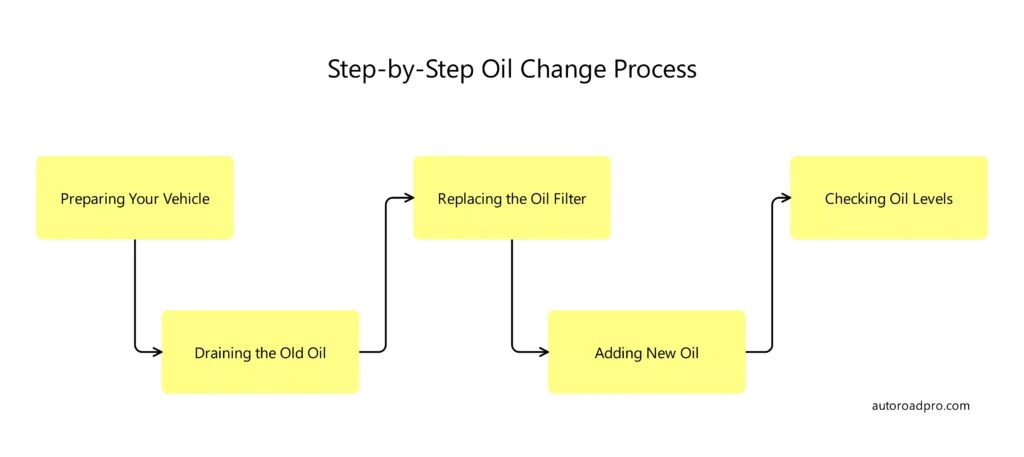Changing the oil in your car is crucial. It’s like giving your car a check-up to keep it healthy and running smoothly. The oil acts as the lifeblood of the engine, ensuring everything works well and lasts longer.
You might ask, “How long does it take to change the oil in a car?” Well, it varies. Different factors can influence the time it takes to perform this essential task.
While there’s no single answer, understanding this helps you realize that each car care session might be unique.
In this article:
What is an oil change and why is it necessary?
Changing your car’s oil is about draining out the old engine oil and putting in new oil. This is very important for keeping your engine healthy.
New oil helps the engine parts move smoothly. It stops them from rubbing against each other too much. It also cleans out dirt and stuff that shouldn’t be there.
If you don’t change the oil when you should, your engine might not work as well. It can even break down.
So, it’s a good idea to keep up with your oil changes to help your car run better for longer.
How Long Does an Oil Change Take?
Changing the Motor oil in your car is a key part of keeping it running smoothly. It usually takes between 30 and 45 minutes.
The time needed can change based on the type of car you have, how complex the oil change is, and how experienced the technician is.

For instance, cars with extensive underbody panels may require additional time to access the oil pan.
What is the Duration for Oil Changes for Different Oil and Dealerships?
Traditional vs. Synthetic Oil
Traditional oil changes take about the same time as synthetic oil changes. The type of oil doesn’t change how long the process takes.
Dealership vs. Quick Lube Shops
At a dealership, you can expect a dealership oil change to take 30-45 minutes on average. It could be longer depending on the workload.
Specific Service Providers
Walmart Auto Care Center usually takes 30-45 minutes.
Pep Boys typically takes 30-45 minutes.
Grease Monkey advertises a 30-minute oil change.
Take 5 Oil Change claims to take 15 minutes.
Jiffy Lube advertises a 15-minute oil change.
Firestone Complete Auto Care usually takes 30-45 minutes.
Valvoline Instant Oil Change claims to take 15 minutes.
Toyota and Honda dealerships average around 30-45 minutes for an oil change.
However, the wait time can vary depending on how many customers they have.
Repair shops are similar to dealerships. An oil change usually takes 30 to 45 minutes, but extra services might make it take longer.
DIY Oil Change:
If you do it yourself, an oil change can take 30 minutes to an hour. This depends on how experienced you are and how well you have everything set up.
How to Know When It’s Time for an Oil Change?
Is it time for your car’s oil change? If you’re not sure, I’ve got some easy tips to help you figure it out. Cars these days usually have a reminder light that turns on when you need an oil change.
But sometimes, we might miss it, or it might not work as expected. If you’ve driven more than 5,000 miles since your last oil change, it’s a good idea to get it checked.
You can also check the oil yourself. It’s pretty simple. Just pull out the dipstick, clean it off, put it back in, then pull it out again to see the oil level. The oil should be between the two marks on the dipstick.
Listen to your engine too. If it starts making sounds you’re not used to, it might be telling you it needs fresh oil. When oil gets old and dirty, it doesn’t lubricate the engine well, which can cause those strange noises.
Don’t forget to consider what the car’s manufacturer recommends—those guidelines are important. Also, take a look at the oil’s color and texture. If it’s dark and gritty, that means it’s time for a change.
So, keep these points in mind, and you’ll keep your car running smoothly!

What Determines the Duration of an Oil Change?
The time it takes to change your oil can depend on a few things. The type of vehicle you have plays a big role. Larger engines need more oil. This means it takes longer to drain and refill them.
The kind of oil also matters. High-performance synthetic oils might need a more careful process compared to regular oils.
Whether you go to a professional service or do it yourself affects the time too. At a service center, they have special tools that can make the process faster.
If you decide to change the oil yourself, it might take a bit longer. However, it can feel good to do it on your own.
How to Oil Change Work? Step-by-Step
Gather all the tools, the right oil, and a new filter for your vehicle. This is the first step in changing your car’s oil. Before you start, warm up your engine. This makes the oil flow out more smoothly when you drain it.
Next, find the drain plug under your car. Remove it carefully and let all the old oil pour out into a pan. Remember, we need to keep the environment clean, so make sure it doesn’t spill!
Now, it’s time to change the oil filter. Take off the old one and put on a new one. Make sure it’s tight, but follow the guidelines so you don’t over-tighten it.
After the old oil is out and the new filter is in place, add fresh oil. Your car’s manual will tell you how much oil to put in. This keeps your car running smoothly.
Finally, do a quick check. Make sure the drain plug is back in place and tight. Look under the car to be sure there are no leaks.
Then, check the oil level to make sure it’s just right. And that’s it! You’ve successfully changed your car’s oil.

What are the Benefits of Timely Oil Changes?
Regular oil changes can lead to:
Engine efficiency and longevity. Clean oil reduces wear and tear.
Better fuel economy. A well-lubricated engine runs more efficiently.
Lower vehicle emissions. Fresh oil burns cleaner, reducing emissions.
What are the Common Oil Change Issues?
After you get an oil change, check for any problems. These could include too much oil, not enough oil, or leaks. If you don’t fix these issues, they can harm your engine.
How Long Does it Take for DIY Oil Change?
If you’re considering doing an oil change yourself, it’s great to know how long it might take.
Getting ready is the first step. You’ll gather all the necessary tools and set up your workspace.
Next, you’ll change the oil. This involves draining the old oil, installing a new filter, and adding fresh oil.
After you’re done, you need to clean up. Make sure everything is back in its place and dispose of the old oil properly.
Taking care to do these steps is essential for your car’s health and safety.
What Factors That Can Extend the Duration of an Oil Change?
Sometimes, an oil change can take longer due to additional maintenance checks. Many service centers perform routine checks alongside oil changes.
Unexpected complications, like stripped oil drain plugs, can also add time.
You might also experience waiting time at the service center, depending on their schedule.
How to Speed Up Your Oil Change Process?
If you want to make your oil change go faster, there are a few smart things you can do.
Scheduling an appointment can help cut down on how long you have to wait.
Picking times that aren’t so busy is another good idea. Avoid weekends or right after work when it’s busiest.
Keeping up with regular maintenance on your car is important. This means taking care of it often so there aren’t any big problems that could make the oil change take longer.
Remember, planning can make your car shop visit much quicker!
How to Choose the Right Oil for Your Vehicle?
Selecting the right oil involves understanding the differences between conventional and synthetic oil.
Synthetic oils often last longer and perform better in extreme temperatures.
Always check your vehicle’s manual for manufacturer recommendations.
Consider the climate, as some oils are better suited for certain weather conditions.

What are the Cost Considerations in Oil Changes?
The cost of changing your oil can vary based on several factors. Doing it yourself might be cheaper, but it requires time and know-how.
The cost also depends on the type of oil, the kind of car, and the service center you choose.
There are some common myths about oil changes that aren’t true. Most modern cars don’t need their oil changed every 5,000 miles.
Not every car requires the most expensive oil, and doing the oil change yourself isn’t always the best or cheapest option in the long run.
Knowing these facts helps you make the best choices for your car.
Final Verdict
When you need to change the oil in your car, it’s good to know how long it will take and what can affect the time. Typically, it takes around 30 to 45 minutes. This helps you plan better.
Changing your car’s oil regularly is important. It keeps your car working well and helps it last longer. By changing the oil, your car runs better, too.
FAQs
How long does it take for an oil change?
An oil change typically takes 30 to 45 minutes to complete. However, the exact amount of time may vary depending on your car’s make and model and the complexity of the oil change. For example, if your car has many underbody panels, it may take longer to access the oil pan.
Can an oil change be done in 10 minutes?
An oil change is unlikely to be done in 10 minutes. This is because several steps are involved, including draining the old oil, replacing the oil filter, and adding new oil. These steps take time to complete carefully and accurately.
Why does it take so long to get an oil change?
There are a few reasons why it may take longer to get an oil change than expected. First, the technician may need to wait for the old oil to drain completely. Second, they may need to remove many underbody panels to access the oil pan. Third, they may need to perform additional checks, such as inspecting the oil filter or checking tire pressure.
Should an oil change take over an hour?
In most cases, an oil change should not take more than an hour. However, there are some situations where it may take longer. For example, if your car has a lot of rust or the technician encounters unexpected problems, the oil change may take longer than usual.
Can I drive immediately after an oil change?
Yes, you can drive your vehicle immediately after an oil change.
What happens if I skip an oil change?
Skipping an oil change can lead to engine damage due to increased friction and heat.
Can I switch between conventional and synthetic oil?
Yes, but it’s best to consult your vehicle’s manual or a professional before doing so.
Is it necessary to change the oil filter every time?
Yes, changing the oil filter with every oil change is recommended to ensure optimal engine health.
How often should I change my oil?
Typically, every 3,000 to 5,000 and 7,500 miles, but check your vehicle’s manual for specific recommendations.
Can I switch between conventional and synthetic oil?
Yes, but it’s best to consult with a mechanic or refer to your vehicle’s manual before doing so.
What happens if I delay an oil change?
Delaying oil changes can lead to engine damage, reduced efficiency, and potentially costly repairs.
Is it cheaper to change the oil myself?
It can be, but it requires the right tools, knowledge, and time—to factor in these aspects before deciding.
How do I know which oil is right for my car?
The right type of oil will be specified in your vehicle’s manual. You can also consult with a professional mechanic.
![03ea5ac8-ead1-32a0-aedc-9b2f37828767 A Boy taking old oil out of the car: How Long Does an Oil Change Take [+FAQs]](https://sienna-wolverine-623584.hostingersite.com/wp-content/uploads/2023/11/How-Long-Does-an-Oil-Change-Take-FAQs.jpg)